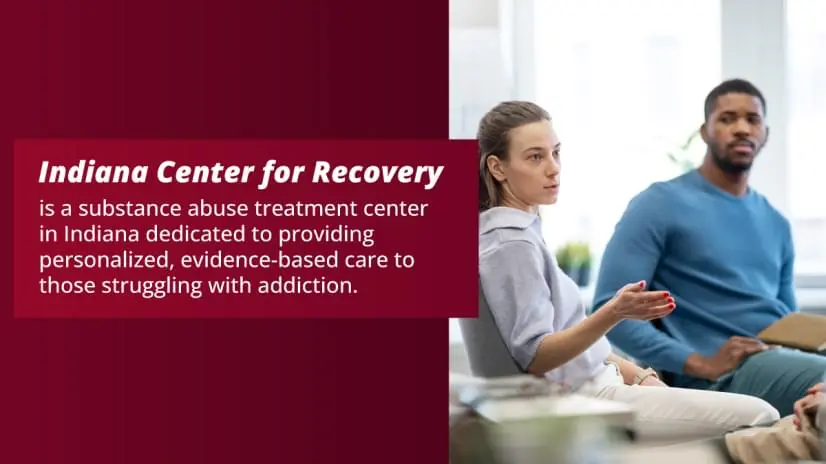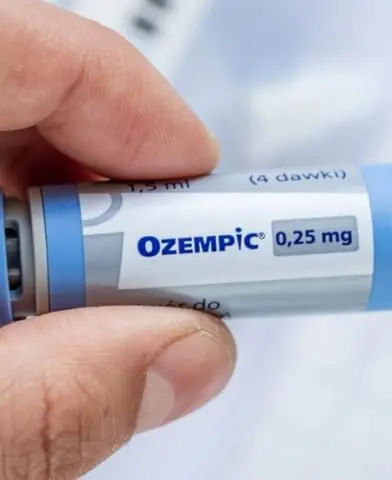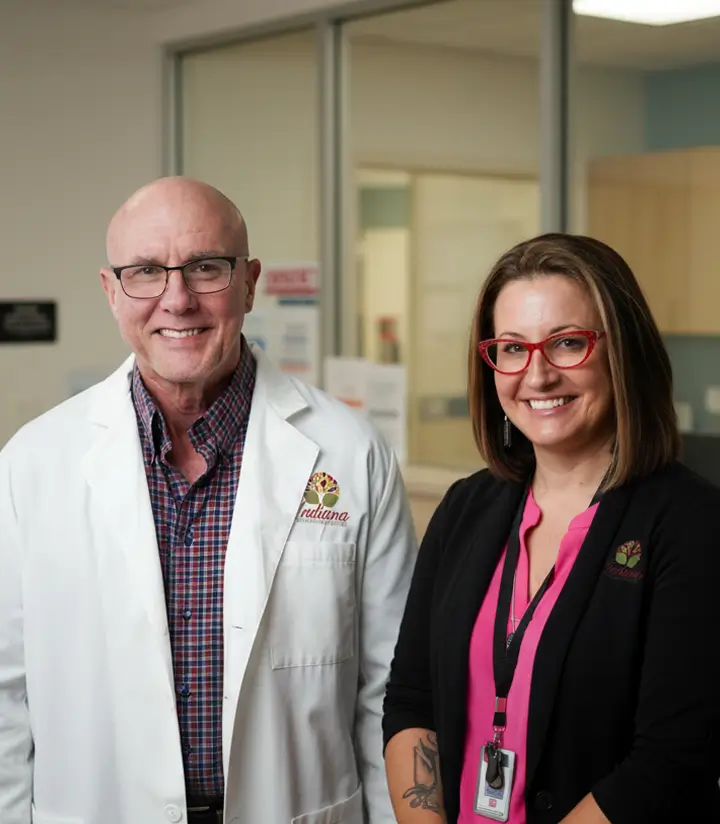
Substance Abuse Treatment Center In Indiana
Clinically Reviewed by:
From the vibrant streets of Indianapolis to the serene countryside of Bloomington, the effects of substance abuse and addiction can be felt across the state, affecting the lives of individuals and families from all walks of life.
Indiana Center for Recovery is a substance abuse treatment center in Indiana dedicated to providing personalized, evidence-based care to those struggling with addiction. We strive to create a safe, comfortable, supportive environment that fosters healing and lifelong recovery.
If you or a loved one are struggling with substance abuse, know you are not alone. Reach out to us today to take the first step.

Understanding Substance Abuse
Substance abuse encompasses a range of behaviors, from occasional recreational use to severe dependence and addiction. It involves the misuse of substances like alcohol, illicit drugs, and prescription medication. This harmful pattern of use can result in physical, psychological, and social consequences for individuals and their loved ones. There are a few different factors that can contribute to an individual’s substance abuse, such as a genetic predisposition, environmental influences, and co-occurring mental health disorders. Factors like peer pressure and trauma can also lead an individual to abuse substances.
Substance abuse essentially re-wires the brain’s reward system which is what leads to this compulsive behavior. Prolonged substance abuse can result in neuroadaptive changes, making it difficult for individuals to control their consumption and leading to a cycle of addiction that often requires professional care to overcome.
Signs of Substance Abuse
If you are worried a loved one is struggling with substance abuse, seek professional help. While the specific symptoms may vary depending on the type of substance being used and individual factors, there are common indicators that may suggest a problem with substance abuse.
Some of these signs include:
- Changes in behavior
- Taking substances in higher quantities
- Physical symptoms such as bloodshot eyes, dilated or constricted pupils, sudden weight loss or gain, tremors, and unexplained injuries
- Withdrawal symptoms such as nausea, sweating, anxiety, or insomnia
- Changes in academic or work performance
- Multiple unsuccessful attempts to quit drinking or using
- Legal problems
- Financial issues
Effects of Substance Use
Chronic substance abuse can lead to a range of health issues, including liver damage, cardiovascular problems, and respiratory disorders. Overdose is another significant concern, particularly with opioids and other potent substances.
Substance abuse often coexists with conditions like depression, anxiety, psychosis, and cognitive impairment. Individuals may experience a cycle of self-medication, where substance use temporarily alleviates emotional distress but ultimately worsens mental health symptoms.
Treatment Options
Effective treatment for substance abuse requires a comprehensive approach that addresses both the physical and psychological aspects of addiction. Detoxification, or detox, is often the first step in the recovery process, involving the safe management of withdrawal symptoms when ceasing substance use. While some people may try to detox at home due to convenience or to cut down on recovery costs, medical supervision is essential, particularly for substances with severe withdrawal symptoms, such as with alcohol and benzodiazepine withdrawal.
Behavioral therapy focuses on addressing the underlying causes of substance abuse and developing coping strategies for recovery. Cognitive-behavioral therapy (CBT) is one of the most common therapies used for the treatment of addiction and mental health disorders. CBT helps individuals identify and change maladaptive thought patterns and behaviors associated with substance abuse.
Medication-assisted treatment (MAT) combines medications with counseling and behavioral therapies to treat substance use disorders effectively. Medications such as methadone, buprenorphine, and naltrexone can help reduce cravings, prevent relapse, and stabilize brain chemistry
Indiana Center for Recovery offers residential and outpatient treatment to meet the diverse needs of our community members struggling with substance abuse. Residential rehabilitation provides intensive, round-the-clock care in a structured environment. Patients will engage in individual and group therapy, educational sessions, and recreational activities. Our outpatient treatment programs offer flexibility for those who cannot commit to residential care or require ongoing support post-rehab. This allows patients to attend therapy sessions, medication management appointments, and support groups while maintaining their daily responsibilities.
Seeking Help for Substance Abuse
Whether by confiding in a trusted friend or family member or contacting a healthcare professional, sharing your concerns and seeking guidance is the first step toward getting the help you need. When you or your loved one is ready to get help for substance abuse, we offer a variety of treatment programs available in residential and outpatient settings. Upon admission, our team will thoroughly assess your condition and create a personalized plan that addresses your specific recovery needs. Our trained and compassionate staff are here to guide you on the path to recovery.
Verify Insurance
At Indiana Center for Recovery, our experienced staff handles insurance verification and coverage details, allowing our patients to focus solely on their journey to recovery. Simply fill out the form to verify your insurance, and our team will promptly contact you with the details, usually within 30 minutes, ensuring a confidential and private process.
Frequently Asked Questions (FAQ)
What is the most common therapy for substance abuse?
The most common therapy for substance abuse is cognitive-behavioral therapy (CBT). CBT focuses on changing unhealthy thoughts and behaviors related to substance use. It helps individuals identify triggers for their substance use and develop coping strategies to manage cravings and avoid relapse.
Through CBT, individuals learn to challenge negative thought patterns and create healthier ways of thinking and behaving. This therapy is widely used in addiction treatment programs across the United States because of its effectiveness in addressing both the psychological and behavioral aspects of substance abuse. CBT empowers individuals to take control of their recovery journey and build a foundation for long-term sobriety.
What are three options for drug abuse treatment?
Three options for drug abuse treatment include residential treatment programs, outpatient treatment programs, and medication-assisted treatment (MAT). Residential treatment programs provide intensive care in a live-in facility, offering therapy and support 24/7.
Outpatient treatment programs allow individuals to attend therapy sessions while living at home, feeding flexibility for those with work or family commitments. Medication-assisted treatment involves the use of medicines, such as methadone or buprenorphine, along with counseling and support services to help manage cravings and withdrawal symptoms.
Get Help for Substance Abuse in Indiana
Substance abuse affects individuals and families across Indiana, from Indianapolis to Bloomington, creating physical, psychological, and social consequences that require professional treatment. If you or a loved one is struggling with substance abuse, whether involving alcohol, illicit drugs, or prescription medications, comprehensive treatment can help you overcome addiction and build a foundation for lasting recovery. At Indiana Center for Recovery, we provide personalized, evidence-based care in a safe, comfortable, and supportive environment that fosters healing.
Our comprehensive addiction treatment programs begin with medically supervised medical detox programs to safely manage withdrawal symptoms when ceasing substance use. Following detox, our residential treatment program provides intensive, round-the-clock care in a structured environment with individual and group therapy, while our outpatient treatment services offer flexibility for those maintaining daily responsibilities. We also offer medication-assisted treatment (MAT) and Cognitive Behavioral Therapy to address both the physical and psychological aspects of addiction.
Many individuals struggling with substance abuse also face mental health challenges, as substance use often coexists with conditions like depression, anxiety, and trauma. Our dual diagnosis treatment addresses both substance abuse and co-occurring mental health conditions simultaneously, using integrated approaches that include mental health treatment to address underlying psychological factors contributing to substance use and support comprehensive recovery.
You don’t have to face substance abuse alone. We offer treatment centers across Indiana where you can access comprehensive substance abuse treatment programs designed to help you overcome addiction and reclaim your life. Our compassionate and experienced staff is available 24/7 to answer your questions and guide you on the path to recovery. Call us today at (844) 650-0064 to learn more about our treatment options and take the first step toward lasting recovery.






 100% Confidential
100% Confidential
